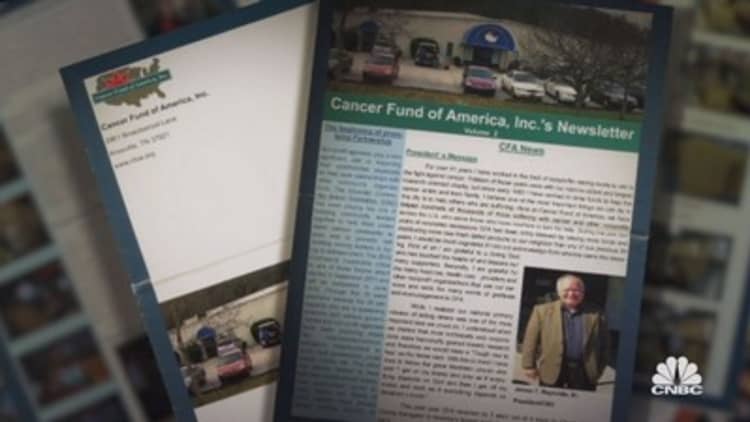The pleas are almost impossible to avoid. From the dinnertime phone calls, to the letters and postcards in the mail, and the emails flooding your inbox, charities are pulling out all the stops to gain your confidence and your donations.
The National Center for Charitable Statistics reports there are roughly 1.6 million nonprofit organizations registered with the IRS, up 24 percent in the past 10 years. Deciding which ones deserve your generosity can be tricky business.
Consider the case of Jim Reynolds, profiled on the latest episode of CNBC's "American Greed." Through a network of supposed charities including the Cancer Fund of America, Reynolds and his family raised $187 million that he claimed would go toward patients with advanced cancer, funding things like hospice care and medical supplies.
Instead, patients received boxes of random items, many of which were useless to cancer patients — like candy, makeup and DVDs. Meanwhile, Reynolds and his family got rich.
"Less than 3 percent actually went to cancer patients and victims," New Mexico Attorney General Hector Balderas told "American Greed." "That's appalling. This would offend even organized criminals and mobsters."
Yet running a charity that spends the vast majority of its resources on "fundraising," as Reynolds did, is not in itself illegal. That is because the Supreme Court has recognized charitable fundraising as a form of free speech.

"Charities are free to spend as much money as they choose on fundraising," said Art Taylor of the Better Business Bureau. "What they can't do is lie. If they lie, then they can be prosecuted for fraud."
Reynolds, who did not respond to multiple interview requests but has maintained his innocence, has never faced criminal prosecution. Last year, without admitting wrongdoing, he agreed to a permanent bar from running a charity as part of a settlement with all 50 state attorneys general and the Federal Trade Commission. But the damage — to both donors and recipients — was already done.
How can you be sure the charity you are donating to will use the money for its programs? The first step is painfully obvious: just ask. But most donors do not.
"You want to ask the organization for a copy of their Form 990," said Sandra Miniutti, vice president of marketing at watchdog group Charity Navigator. Form 990 is the return that every tax-exempt organization must file annually with the IRS, and it is a public document.
"By law, they're required to provide their last three filings to anybody who makes a request," Miniutti said.
You can also look up the forms on sites like Charity Navigator and Guidestar. Those organizations, as well as the Better Business Bureau's Wise Giving Alliance, also offer evaluation reports for thousands of charities.
Especially for larger organizations, the 990 can be lengthy. But here are a few basic things to look for.
- Revenue vs. expenses: Beware of outsized compensation paid to the CEO or other employees, all disclosed on the first page of the form. Check out how much the organization spent on fundraising. If these amounts make up a large percentage of the organization's revenue, also disclosed up top, that could be a red flag.
- Conflicts of interest: Later on in the return, the organization will list its leadership, including its board members and top executives. Are any of them related to one another? Are there enough independent outsiders on the board to keep the management honest? Look for any signs of cronyism.
- Accomplishments: A reputable charity should be able to describe what it is doing with its money. Vague or incomplete statements on the form could be tips about the charity's effectiveness — or lack of it.
Even if the Form 990 checks out, your work is not done. Before donating, check out the organization's privacy policy. Otherwise, you could find yourself on a list.
"Many charities will sell or trade your contact information with other organizations, and that's how you wind up with a mailbox full of appeals from charities you've never heard of before," Miniutti said.
"So if you don't want that to happen, be sure to ask the charity if they have an opt-out policy, or if they have a flat policy where they'll keep your information confidential," she added.
Of course, most charities try to get you to skip past all of this research. That is why they call you on the phone and appeal to your emotions. Reynolds was particularly adept at using telemarketers to raise funds for his charities, but even the most legitimate organizations solicit donations this way.
"You should never feel pressured to give over the phone. In fact, we recommend just politely hanging up," Miniutti said. "You don't know if it's a legitimate request — it could be just somebody trying to steal your personal information and your finances, or it could be a legitimate charity that's just simply not worth your investment because it's not living up to its charitable mission."
Similarly, beware of appeals online, or through emails or social media. There is simply no substitute for doing your homework, and for taking your emotions out of the equation.
"Many times we've seen that when there are issues that really tug at your heartstrings, as it is with people afflicted with cancer, donors are less likely to ask questions," Miniutti said.
That is the kind of gullibility that James Reynolds counted on, allowing his charities to stay in business for years before the authorities caught on — too late for patients and their families who were truly in need.
See how James Reynolds used savvy marketing to line his own pockets, on an all-new episode of "American Greed" on Monday, June 26 at 10p ET/PT on CNBC.




